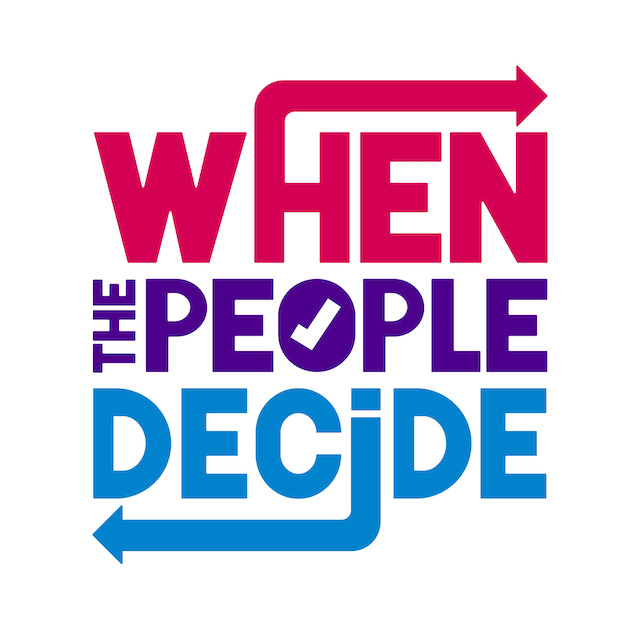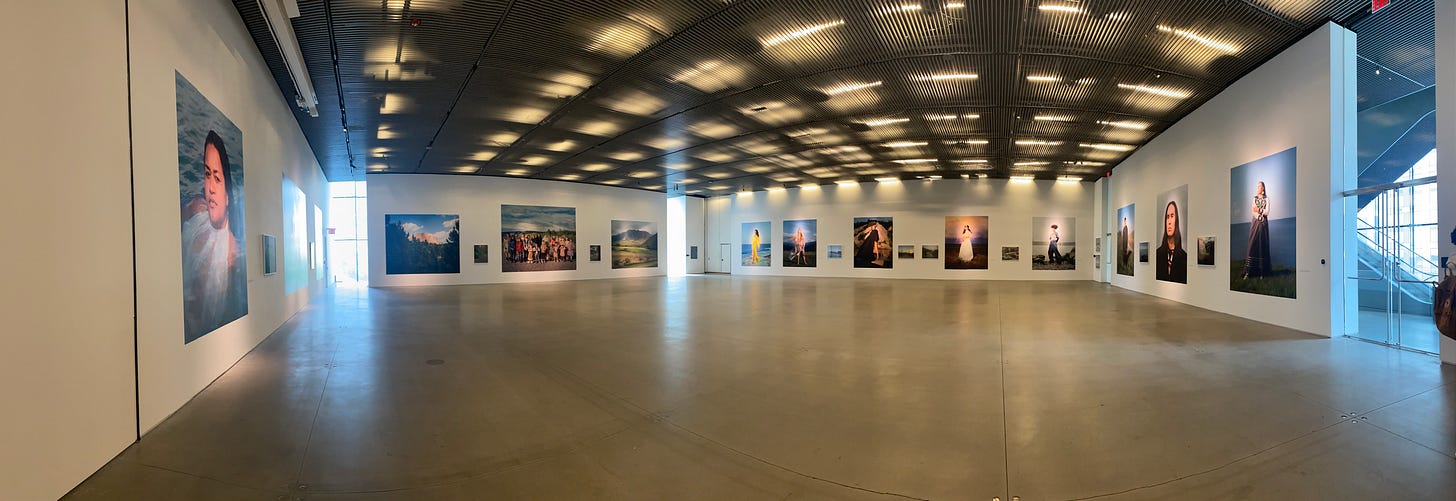Tick Tock: Marching Against the Climate Clock
Sounds Like Impact: A newsletter for audio and action - Vol. 21
If there was ever an edition I wanted to you read / listen to in it’s entirety, it’s this one…
Welcome to Sounds Like Impact!
It’s Climate Week! Climate Week convenes in NYC during the week of the UN General Assembly (UNGA) meeting. Folks from around the world attend events where the through-line is focusing on climate action. There is truly something for everybody, whether you are in media, business, community organizing, science, you name it.
With that, this week’s newsletter is about climate activism, and particularly about the rising criminalization of protestors and the philosophical debates surrounding direct action.
Also forewarning that I share some personal news, so this edition is a bit longer than usual. But before we get into all of that…
Today’s newsletter is sponsored by When the People Decide!
When the People Decide is a podcast about how everyday people shape democracy. Learn about grassroots ballot initiative campaigns, libraries as civic spaces, the rebirth of local news, and more. Subscribe now to hear the first two seasons.
ICYMI
Speaking of democracy, last week we had a guest curation from the Girl and the Gov podcast team and I interviewed Blake Pfeil from abandoned: The All-American Ruins. National Voter Registration Day was yesterday, are you registered to vote?!
Reminder: To guest curate, be interviewed, advertise and more, click here.
We hit 500 subscribers on Monday! Thank you all for believing in this newsletter! Your support means everything. If you can, I would love to reach more people and hear from you about how this newsletter can serve you better. For the former, hit share below and for the latter, email me at soundslikeimpact@unofficialsocialchair.com.
And lastly, a special thank you to Alex T for their donation! If a paid subscription is not in the cards right now, but you would like to support the newsletter financially, you can donate below. I’m grateful for any amount.
Some personal news…
🎧 Listen
My first episode for Degrees: Real-talk about planet saving careers, is out! You can listen here to the story of Ciara Imani May, CEO of Rebundle: a plant-based hair extensions product.
Working with the Podcast Allies and Environmental Defense Fund teams has been a dream! And I am especially grateful to #SoundsLikeImpact community member Elaine Appleton Grant for trusting in me to work on this show and providing what feels like endless support.
By the way, Elaine hosts Sound Judgment and just dropped the new season trailer. There is so much I’ve learned from her and her guests about podcasting. So, subscribe if you want to know more about putting together impactful shows!
📖 Read
Also, my first paid writing piece was published earlier this month! Earth in Color partnered with Grist on a series called Eatin’ Good about Black food-ways and environmentalism in the tri-state area. I profiled Ben Harney Jr., aka Moody, of Real Mother Shuckers, who you might have seen featured in the Netflix documentary High on the Hog.
Sign up to get the newsletter, which will share the complete series, and / or follow on Instagram.
These past few months for me have been a reminder that things can always come full circle. While I ended up not pursuing journalism in college (I focused on environmental health and human ecology instead), I’ve gotten to combine my interests again in storytelling and environmental issues thanks to these opportunities. I am eternally grateful and would love to continue doing more of this work.
🎧 #AudioForAction Theme of the Week
Dissecting climate activism and its coverage
This is the most important Sounds like Impact curation I’ve done so far.
September 17th in New York City was the March to End Fossil Fuels. Over 75,000 people of all ages, races and abilities took to the streets to protest our world’s reliance on fossil fuels. Sadly, I was not there, but saw dispatches from friends and those I admire being in solidarity with one another to make sure our politicians and fossil fuel execs know that we are fed up with lies and inaction.
Protesting globally has never been under such scrutiny, at least in higher income countries. All throughout the U.S., and even in the UK, laws are being passed that essentially criminalize protesting. The laws won’t say that, but are written in broad and overreaching ways. Recently in Japan and South Korea, folks protesting nuclear waste water discharge were arrested.
About a month ago I watched the film How to Blow Up a Pipeline. Even though there have been critiques levied against the book that the film is based on, it gave me a lot to think about (FYI the ebook is free at the link). And in the Q&A I attended, and podcasts I’ve listened to, two questions have stood out to me:
Who gets to decide who is considered a patriot and who is considered a terrorist?
When can sabotage be considered a form self-defense?
I don’t have the answers and I lot of this is fundamentally subjective, but I do know that I am grateful to those who put their bodies and lives on the line to fight for a habitable planet for all. So I am working on doing what I can to be vigilant and make others aware that ALL of our rights are on the line. We currently live in a time where protestors and those doing mutual aid are being charged like they are members of the mob.
Last week we talked civic engagement through the electoral system and it has a role here too. As I mentioned in a previous edition thanks to a reminder from Chloe Cockburn , who we elect as prosecutors makes a difference in what charges are brought before the courts. Where people are appointed in the judicial system, those you elect to appoint make the difference. I’ll be the first to say our democracy is not perfect, but not every battle can and should be fought in court or by a nonprofit or community. But if necessary, who we elect does make a difference.
The TLDR: Protecting protest is important for all of us–even if you don’t protest yourself–and so listen to this curation and do some CTAs to stay vigilant.
Outside/In, When protest is a crime, part 1: the Standing Rock effect
Learn about the critical infrastructure bills being passed across the country thanks to one organization in particular — ALEC. This is how environmental protestors are being criminalized around the country. The thing about these laws though is that they are quite broad, and that should concern everyone.
Part 2 is just as important a listen and a reminder that if we don’t address racial injustice and the rise of wh*te supremacist actions that this poses a danger to us all.
Drilled, How the Media Has Helped to Criminalize Climate Protest, with Evlondo Cooper
If you work in media or want to be media literate, especially pay attention to this episode. This season of Drilled is really important listening because it is looking a free speech threats more generally. I hope you will listen to the rest of the episodes.
How We Survive, Should we blow it all up?
This particular episode looks at the ethics of sabotage as a form direct action and features interviews with some of the team behind How to Blow Up a Pipeline.
Moral Maze, The Morality of Climate Activism
Continuing the philosophical debate, this episode mostly focuses on climate protests and less about sabotage. Though I’m sure some of the people in this episode might conflate the two.
And while this episode is rooted in what is happening in the UK, a lot of the different viewpoints you can find all over the world. It’s worth listening to the whole thing, and for those who you might disagree with, remember the best defense is an offense.
What in the World, Why are young people fighting for climate action in court?
The legal system has been used as a vehicle for climate activism before, but young people around the world are using their respective systems in a whole new way. I include this because for those that aren’t interested in or have a fear around protesting, there are those bringing the fight in from the streets and into the court rooms. By the way, young people aren’t the only ones suing for a habitable planet: recently, California filed a suit against Exxon.
🚨 Calls to Action
Attend: I mentioned Climate Week and it’s still happening through September 24th! There are virtual events if you aren’t in the NYC area.
Climate Week NYC (in-person and virtual)
Futerra Solutions House (in-person and virtual)
NY Climate Tech by Alec Turnbull & Sonam Velani put together this list of events happening across sectors and formats.
Act: If direct action work interests you, here are some organizations that might be a fit (and this is not to say that’s all these orgs do, but they are involved):
Youth
Third Act (geared toward senior citizens)
Mothers Out Front (h/t friend of #SoundsLikeImpact Rekha Murthy).
Climate Defenders (multigenerational)
Listen: Want more insight into what was happening on the ground with the Cop City protests in Atlanta, Georgia? It Could Happen Here did a 3-part series on the Cop City protests (1, 2 and 3).
P.S. Scientist, author and podcaster Dr. Katharine K. Wilkinson wrote this op-ed about Cop City for CNN.
Donate: Organizations such as the Center for Constitutional Rights are fighting charges levied against protestors. Learn about their work and support if it moves you.
You can also donate to the Climate Emergency Fund, which supports climate activists through grant-making (CTA added 9/21).
Also, often after protests, bail funds are set up by people in community. You can always seek those out if you want to channel your funds that way.
Look: Protests can be full of joy and community. Here are some activists I follow sharing moments from the March to End Fossil Fuels: Arielle King, Dr. Katharine Wilkinson, and Bill McKibben of The Crucial Years and founder of Third Act.
*If you were there, please share photos via email or Instagram so I can share with others in our community!
Support: I’ve said it multiple times before, and I will say it again: support independent journalists doing climate reporting. HEATED , Drilled Media, Yessenia Funes of Possibilities are some recs on my end. If you know of others, feel free to leave a comment and I’ll share.
Heated has written more than a few times about activists. I recommend: Why did this climate scientist chain herself to a pipeline? and What you won’t hear at India’s G20.
Revisit: This previous newsletter about environmental crimes (& the CTAs too!).
One last thing…
Before I go, I want to send you off with one more CTA:
Read “A New Series, “Tokala,” Spotlights BIPOC Youth Climate Activists.”
My talented friend Marcus Correa styled these activists, and he hosted a panel and opening this past weekend at The Shed about intersectionality and climate. Unfortunately, I wasn’t able to make it to the events, but I got to see the exhibit before I went to another Climate Week event.
I just hope that even if you are ambivalent about protesting or activism, you can remember that the people fighting for our ability to survive on this planet are deserving of our attention and care, especially those who have been marginalized and those who have so much life to live if we can take care of each other and our planet.









